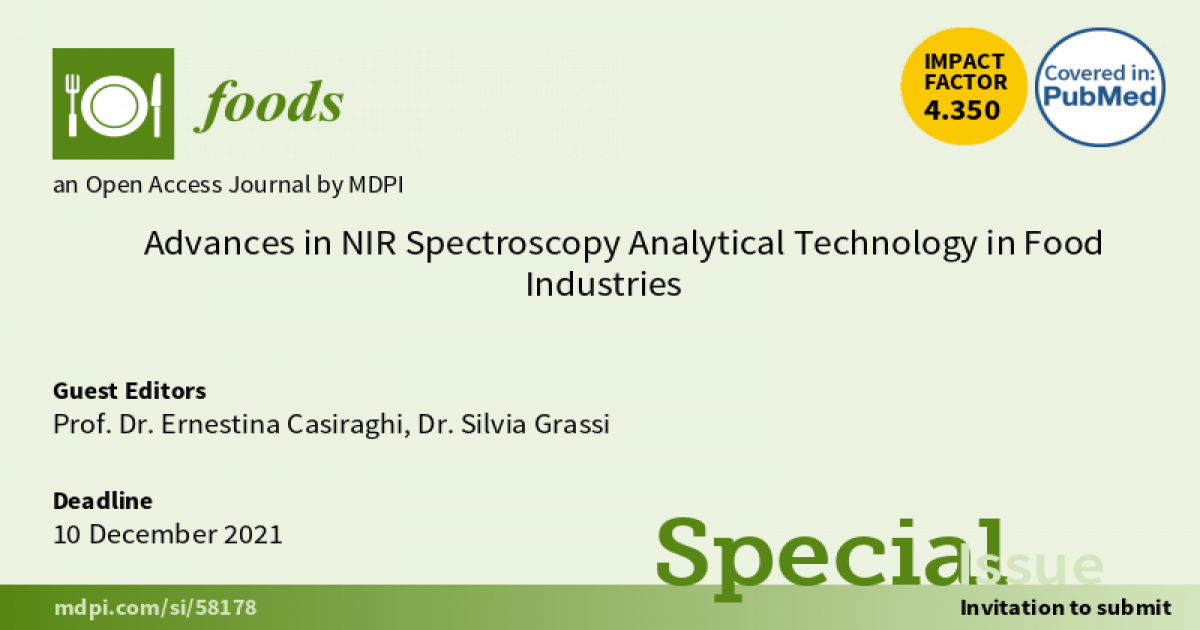Advances in NIR Spectroscopy Analytical Technology in Food Industries
A special issue of Foods (ISSN 2304-8158). This special issue belongs to the section "Food Analytical Methods".
Deadline for manuscript submissions: closed (10 December 2021) | Viewed by 39305

Special Issue Editors
Interests: Process Analytical Technology (PAT) applied to food; food technology; food quality; food authentication; green chemistry; sensing technologies; spectroscopy; infrared spectroscopy (IR); near infrared spectroscopy (NIR); optical sensors; image analysis; colorimetric analysis; food rheology; Chemometrics; multivariate data analysis
Interests: process analytical technology (PAT) applied to food; food quality evaluation; food authentication; non-invasive technologies; e-sensing technologies; spectroscopy; image analysis; electronic nose; chemometrics
Special Issues, Collections and Topics in MDPI journals
Special Issue Information
Dear Colleagues,
the concept of Industry 4.0 has prompted a reorganization of the control systems to optimize the production, guaranteeing safer food. Process Analytical Technology, a.k.a. PAT, seems to perfectly respond to the food industry demands in terms of food quality management along the process.
Near Infrared Spectroscopy (NIRS) serves the PAT approach as promising process analyser among e-sensing technologies, thanks to its ability in fingerprinting materials and simultaneously analysing different physicochemical phenomena occurring along the process.
The implementation of NIRS Analytical Technology in Food Industries offers some obvious advantages which include controlled and optimized utilization of raw materials, reduction in process cycle time, replacement of slow and costly laboratory testing, and, most importantly, it enables continuous learning, envisioning process and product innovation.
This Special Issue is dedicated to bridge the gap between NIRS potentials and its actual implementation as Analytical Technology in Food Industries. The goal is to close the control loop providing an efficient and automated processing management that could contribute to the minimisation of the environmental footprint of food processing.
Kinds regards,
Prof. Dr. Ernestina Casiraghi
Dr. Silvia Grassi
Guest Editors
Manuscript Submission Information
Manuscripts should be submitted online at www.mdpi.com by registering and logging in to this website. Once you are registered, click here to go to the submission form. Manuscripts can be submitted until the deadline. All submissions that pass pre-check are peer-reviewed. Accepted papers will be published continuously in the journal (as soon as accepted) and will be listed together on the special issue website. Research articles, review articles as well as short communications are invited. For planned papers, a title and short abstract (about 250 words) can be sent to the Editorial Office for assessment.
Submitted manuscripts should not have been published previously, nor be under consideration for publication elsewhere (except conference proceedings papers). All manuscripts are thoroughly refereed through a single-blind peer-review process. A guide for authors and other relevant information for submission of manuscripts is available on the Instructions for Authors page. Foods is an international peer-reviewed open access semimonthly journal published by MDPI.
Please visit the Instructions for Authors page before submitting a manuscript. The Article Processing Charge (APC) for publication in this open access journal is 2900 CHF (Swiss Francs). Submitted papers should be well formatted and use good English. Authors may use MDPI's English editing service prior to publication or during author revisions.
Keywords
- near-infrared spectroscopy (NIR)
- food industry
- process analytical technology
- industry 4.0
- sustainability
Benefits of Publishing in a Special Issue
- Ease of navigation: Grouping papers by topic helps scholars navigate broad scope journals more efficiently.
- Greater discoverability: Special Issues support the reach and impact of scientific research. Articles in Special Issues are more discoverable and cited more frequently.
- Expansion of research network: Special Issues facilitate connections among authors, fostering scientific collaborations.
- External promotion: Articles in Special Issues are often promoted through the journal's social media, increasing their visibility.
- Reprint: MDPI Books provides the opportunity to republish successful Special Issues in book format, both online and in print.
Further information on MDPI's Special Issue policies can be found here.







